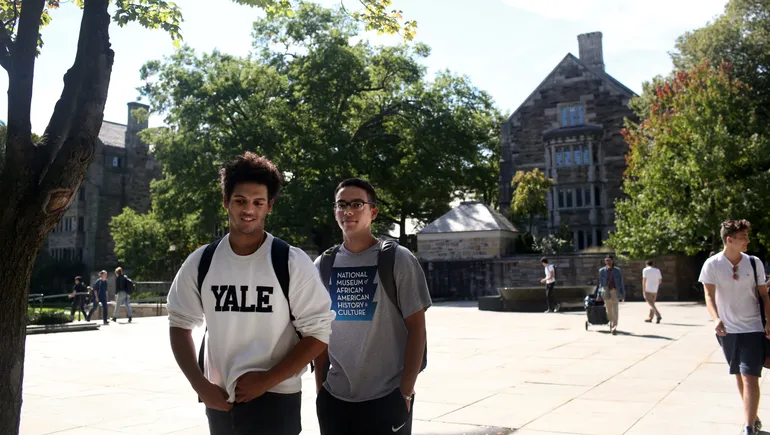Earlier this year, Yale University joined a handful of other Ivy League and highly selective institutions that shed their policies making standardized tests optional for applicants.
Other prestigious institutions that have recently reverted back to policies requiring the SAT and ACT include Brown University, Georgetown University, Dartmouth College and the University of Texas at Austin. The Massachusetts Institute of Technology reinstated its testing policy in 2022.
The high-profile moves raise questions about the future of the test-optional movement that was gaining momentum before becoming widely adopted during the COVID-19 pandemic, when students couldn’t take the tests in-person due to lockdown restrictions.
At the heart of the matter is whether test-optional policies actually help even the college admissions playing field for students who are part of racially, economically and geographically underrepresented populations. Standardized testing critics say such requirements give wealthy students who pay for pricey test prep and tutoring an advantage during the admissions processes.
However, some college leaders are now finding that test-optional policies are harming their disadvantaged applicants — a contention disputed by several advocates and experts on the issue, who stand by their belief that the movement will continue.
Brown, Dartmouth and Yale are the outliers, Bob Schaeffer, public education director at FairTest, said in an email. FairTest advocates for standardized testing reform.
“Except at a handful of super-selective institutions, applicants face a system in which ACT/SAT-optional policies are the new normal,” Schaeffer said.
More than 1,900 institutions that offer bachelor’s degrees have extended test-optional or test-free policies, meaning they don’t accept exam scores, through the fall 2025 application cycle, according to the latest tally by FairTest . That includes selective institutions like the University of Pennsylvania and Vanderbilt University.
Moreover, at least 1,700 institutions have test-optional or test- free policies with no expiration date, Schaeffer said.
“For the vast majority of schools and applicants, ACT/SAT scores will not be required for the foreseeable future,” Schaeffer predicted.
Why are some colleges ditching the test-optional movement?
Yale has not fully reverted to its pre-2020 testing policies. The university once again requires the submission of standardized tests, but it will now accept International Baccalaureate or Advanced Placement exam scores in place of SAT or ACT scores.
Standardized tests are “imperfect and incomplete alone,” Jeremiah Quinlan, Yale’s dean of undergraduate admissions and financial aid, said in the university’s February announcement.
But they can help establish whether a student is academically prepared for college-level work. They are also valuable for students attending high schools that have fewer academic resources and college-preparatory courses, he argued.
He noted that admissions officials place greater weight on other application elements when students don’t submit scores. These substitutes, like advanced courses, are readily available at well-resourced schools, he said.
Other high-profile institutions have cited similar reasons for moving away from their test-optional policies.
Just before Dartmouth announced its decision in February to reinstate mandatory testing, a working group at the college submitted a report to college leadership contending that test scores better positioned the institution’s admissions officials to identify “high achieving less-advantaged applicants.”
Students coming from high schools where average SAT scores are relatively low but who test well compared to their peers have a better chance at being admitted to the college. When test-optional policies are in place, those students`are less likely to be identified and admitted, the report added.
Under test-optional policies, “many high-achieving less-advantaged applicants choose not to submit scores even when doing so would allow Admissions to identify them as students likely to succeed at Dartmouth and in turn benefit their application,” the report stated.
The move to revert back to test-optional policies may not be limited to highly selective institutions.
Of more than 200 test-optional schools, 15% stated last year “they are considering or will definitely reinstate” their exam requirements, according to a Kaplan survey published in February.
The company’s survey also found that 67% of those same test-optional schools said the submission of competitive exam scores can help students’ applications. Kaplan, through its test prep services, financially benefits from students taking the SAT and ACT exams.
Other outside researchers share the same view as Brown, Dartmouth and Yale.
A recent study from Opportunity Insights, a research group based at Harvard University, found that SAT and ACT scores have “substantial predictive power for academic success in college.”
The study examined students attending the eight colleges in the Ivy League, as well as Stanford University, Massachusetts Institute of Technology, Duke University and the University of Chicago. It found that students with higher exam scores were more likely to have higher GPAs in college than their peers with lower scores, and that high school GPAs actually do a poor job at predicting academic success in college.
The study also found that students from different socioeconomic backgrounds with comparable standardized test exam scores receive similar grades in college.
“We conclude that standardized test scores may have more value for admissions processes than previously understood in the literature, especially for highly selective colleges,” the study stated.
Harvard economics professor David Deming, a research collaborator with Opportunity Insights, argued in a recent essay in The Atlantic that test-optional admissions makes the “already-bewildering college-application process” even more complex — and complexity tends to harm people who are disadvantaged.
Simplifying the application process, however, would benefit more low-income students, Deming argued.
In defense of test-optional policies
Not all researchers share those conclusions that exam requirements help.
An analysis from Jacob Vigdor, a public policy and governance professor at the University of Washington, found test-optional cohorts at Brown, Dartmouth, and Yale actually had a higher share of incoming first-year students who were eligible for need-based aid.
Colleges can recruit a student body that is both diverse and academically qualified, with or without standardized tests, Vigdor said in an email. The question, he asked, is: should higher education institutions support a system that collectively costs families billions “to provide colleges information they don’t really need?”
Earlier this year, the University of Connecticut extended its test-optional policies through fall of 2026. In 2021 and 2022, UConn saw the number of first-year applicants who identify as part of an underrepresented racial group grow by about a quarter compared to 2019, when the university had not yet implemented such policies.
That translated to enrollment growth for underrepresented student populations, including first generation students and low-income students who qualify for federal Pell grants, the university reported.
After implementing test-free policies in 2020, the University of California system in August also reported record-highs in incoming students that are part of racially underrepresented communities.
“Except at a handful of super-selective institutions, applicants face a system in which ACT/SAT-optional policies are the new normal.”

Bob Schaeffer
Public education director, FairTest
The impact colleges see when moving away from ACT and SAT score requirements differs from institution to institution, David Hawkins, chief education and policy officer at the National Association for College Admission Counseling, said in an email.
Some colleges have “encountered striking success,” garnering a higher number of applicants and a more diverse applicant pool, said Hawkins. Others, however, have seen more moderate outcomes, he added.
“In general, there does seem to be a positive effect of attracting applicants, including those from underrepresented backgrounds, since test-optional policies seem to remove one major barrier for many students,” said Hawkins.
Over 1,000 colleges had test-optional policies before the pandemic, and “there will likely be many more colleges that remain test-optional post-pandemic,” said Hawkins. However, he added, there will be “some movement” back toward testing requirements.
Vigdor also doesn’t believe that all colleges will follow the lead of those elite institutions. Like any barrier to college access, when institutions drop test score requirements, they encourage more students to apply, said Vigdor.
As a growing number of institutions grapple with declining enrollment trajectories, they will face pressure to do “whatever it takes to keep application numbers up,” he said. That includes attracting any and all students, not just diverse student bodies, he said.
Those pressures don’t apply to the most prestigious institutions, Vigdor added.
Admissions reform still needed
Eliminating test score requirements is not a silver bullet that removes all barriers to access to institutions, Schaeffer said.
He suggested that colleges roll back policies known to favor affluent applicants, such as legacy admissions and early decision, which locks admitted students into attending an institution before they receive their financial aid packages.
Institutions could also recruit students from historically underrepresented schools and regions much more aggressively, said Schaeffer.
When the University of Chicago announced its test-optional policy in 2018, it also introduced a suite of other measures aimed at recruiting first-generation, rural, low and middle-income and other underrepresented students.
That includes increased financial aid, a summer program for prospective students, admissions workshops, professional development for rural school counselors and a mentorship program.
Through those changes, the university implemented “truly holistic admissions that assess applicants based on a broad range of factors rooted in each teenager’s life experiences,” Schaeffer said.
#Whats #testoptional #movement










